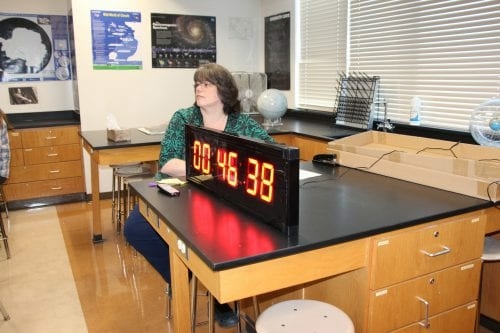BETHLEHEM — Bethlehem High School science research teacher Jamie Rowe was recently selected as one of less than seven teachers in the nation to take part in the 2017 NASA/IPAC Teacher Archive Research Program (NITARP), a program involving teachers in authentic astronomical research using NASA’s extensive archive of data from space- and ground-based telescopes.
Through NITARP, educators are partnered with a mentor professional astronomer for an original research project. They are then expected to incorporate that experience into their classrooms and share their experience with other teachers. Program goals include “the fundamental NASA goals of inspiring and motivating students to pursue careers in science, technology, engineering, and mathematics as well as to engage the public in shaping and sharing the experience of exploration and discovery.”
“Jamie Rowe,” said BCSD Superintendent Jody Monroe, “in teaching our Science Research program and now with an amazing opportunity to work with NASA, is leading by example.”
Rowe will travel to Texas this week for the American Astronomical Societies (AAS) winter conference where she will meet her teammates and decide upon a research problem to pursue. The research is a year-long project and, at the completion, Rowe and her teammates will present their findings at the AAS conference in January 2018.
In Rowe’s Science Research Year One class at Bethlehem High, sophomore students are participating in scientific research by selecting a topic of their choice and studying it throughout the year, learning skills and methods required to do original research. The BCHS Science Research curriculum is a three-year program and first-year projects have the potential to culminate in a senior research project being entered into regional, state and/or national science competitions. This year, Rowe is teaching all three sections.
In her sophomore class, Rowe’s students develop skills in using the internet’s capabilities, conduct online bibliographic searches of international databases, conduct statistical analysis using appropriate software and incorporate visual presentation techniques. They are also able to learn the process of peer reviewing — each student receives a Microsoft Surface tablet at the start of class and grades the presenters based on presentation skill and content.
On Thursday, Dec. 15, Rowe’s class began to give their third round of presentations on their chosen topic. These students have been researching and assessing peer reviewed professional research journal articles for 14 weeks.
The next step is to look for research mentors with whom they can do an internship with over the summer and continue into their junior year.
According to Rowe, students have worked on a wide variety of topics, including: cancer treatment either with new drugs or gene therapy; bioengineering; tissue engineering; and genetically modified foods. Research topics may come from math, physical sciences, life sciences, social sciences or psychology. Seniors in their third year of the Science Research program presented some of their project findings during the October Board of Education meeting.
“Science Research is a unique course,” said a senior who chose to do his research in the field of oncology. “You aren’t taught anything or tested on material. It’s more of a thing where you take on a field and you want to expand the horizon and see what you can learn.”
His research took him from studying the effects of drugs through bio-sensing — specifically, the early detection of cancers in the blood — and two summers interning for a chemist at UAlbany, during which he was able to learn basic lab procedure, as well as about DNA “biomarking” and coding methods.
“My hope is that they are able to find a mentor who can get them into a lab to see first-hand what science research is all about,” said Rowe.
Students spoke enthusiastically about the independent nature of the curriculum, how it helped them in other courses and influenced their plans to pursue their work in college and, ultimately, their careers.
Rowe said that she hopes her first-year students will choose to continue with the program and study their topic all the way to their senior year, which is spent writing the research and presenting it at science competitions.
“They can spend as much time as they would like learning about [their chosen topic],” said Rowe. “And receive credit for it.”
“We strive to provide students with an innovative and cohesive educational program that includes a challenging and rigorous academic curriculum,” said Monroe. “[Rowe} is proving to our students that learning never ends and that science is indeed, very cool. We look forward to following her research journey with NASA.”
According to NITARP, which is offered through CalTech, the program components involve multiple trips over 13 months, paid for by the program, and “a commitment from the teachers to educate others about their experiences.”



